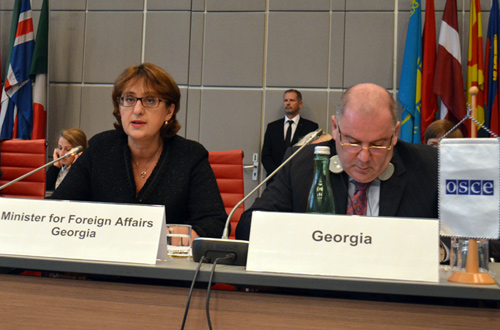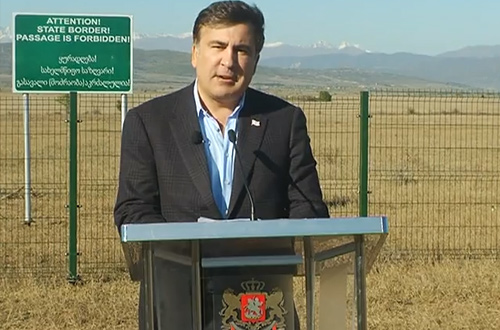| Georgian FM Addresses OSCE Permanent Council |
| Civil Georgia, Tbilisi / 10 Oct.'13 / 21:38 |

Georgia’s Foreign Minister Maia Panjikidze (left) addresses OSCE’s main decision-making body in Vienna on October 10. Konstantine Zaldastanishvili (left), Georgia's ambassador to Austria and permanent representative to OSCE. Photo: Georgian MFA
Addressing OSCE Permanent Council in Vienna on October 10, Georgia’s Foreign Minister Maia Panjikidze slammed “the Russian occupation forces” for installation of barbwires and fences along breakaway South Ossetian administrative boundary line and expressed “extreme concern over the critical situation” in and around the breakaway regions.
“These illegal activities are totally inconceivable against the backdrop of the positive dynamic recently established in the economic and cultural relations, and a number of constructive steps undertaken by the government of Georgia with the aim to de-escalate and normalize relations with Russia,” she said.
Panjikidze said that by now the total length of barbwires along “the Tskhinvali occupation line has reached 35 kilometer and the process of arrangement is still in progress.”
The process, she said, affected around 65 Georgian families, “while several of them were forced to flee their places of residence left behind the occupation line, thus, creating a further wave of IDPs.”
She called on Russia to “immediately stop and reverse” the process of the barbwire and fence installation and to comply with the 2008 ceasefire agreement.
In her address, Panjikidze also touched upon the Sochi Olympic Games and said that Moscow decided to use the event for “political motives.”
Intense debates about Georgia’s participation in the Sochi Olympic Games were prompted in Georgia after Russia made its military pilot, Ivan Nechayev, who received hero’s award for his role in the August 2008 war with Georgia, as one of the Olympic torchbearers.
“Georgia has demonstrated its good will, and in an effort to depoliticize the Olympic Games, made a difficult decision to participate in Sochi, Moscow decided to use this event for political motives and opted for a provocative manner,” the Georgian Foreign Minister said.
She also said that despite of “destabilizing processes and provocative acts”, the Georgian government remains committed its “peaceful and pragmatic approach and are not going to react in a same provocative manner.”
On Geneva talks, launched after the August 2008 war, Panjikidze expressed regret that “destructive attitude” of participants from breakaway Abkhazia and South Ossetia, which, she said, was “orchestrated by Moscow”, was hindering progress.
Non-use of force and international security arrangements represent one of the key issues regularly discussed at the Geneva talks. “It should be clearly emphasized that the progress on this issue is possible only after the Russian Federation reciprocates the Georgia’s unilateral legally-binding non-use of force pledge, undertaken by the President in November 2010 and reiterated by the new Parliament of Georgia in March 2013,” the Georgian Foreign Minister said.
She called to intensify efforts towards “the restoration of a full-fledged and comprehensive OSCE presence on the ground, equipped with the peacekeeping and police mandates within the occupied regions.”

Screengrab from President Saakashvili’s televised address, delivered on October 10 from the village of Dvani in front of a fence installed by the Russian troops along breakaway South Ossetia’s administrative boundary line.
Meanwhile in Georgia, outgoing President Saakashvili made on October 10 a televised statement from Dvani, one of the villages on the administrative boundary line of breakaway South Ossetia, affected by ‘borderisation’.
Standing at a lectern, placed in a field just in front of a fence, installed by the Russian troops, President Saakashvili said that creeping occupation and grabbing of more lands by the occupying force is an “attack on our sovereignty and independence.”
“Unlike some others, I don’t think it is a misunderstanding,” Saakashvili said, referring to PM Ivanishvili’s remarks.
Referring to Ivanishvili’s remarks that ‘borderisation’ process was related to Russia’s preparations for the 2014 Sochi Winter Olympic Games, Saakashvili said: “Of course that’s not the case and it is very regrettable that head of the government is saying it.”
Saakashvili said Georgia should respond to Russia’s actions “calmly, but firmly” and with unity within Georgia. He said that for that reason he offered holding of the National Security Council, which was snubbed by PM and parliament speaker as Saakashvili’s PR stunt.
In her address to the OSCE Permanent Council, the Georgian Foreign Minister also spoke about ongoing reforms in Georgia, which she said are aimed at strengthening democracy, rule of law and human rights.
On upcoming presidential election she said, echoing statement of PM Ivanishvili: “We are confident that these elections will be exemplary.”
“In light of the upcoming Eastern Partnership Vilnius Summit, this will once again convince our partners in the value of their support to Georgia on its path of the European and Euro-Atlantic integration,” Panjikidze said.
